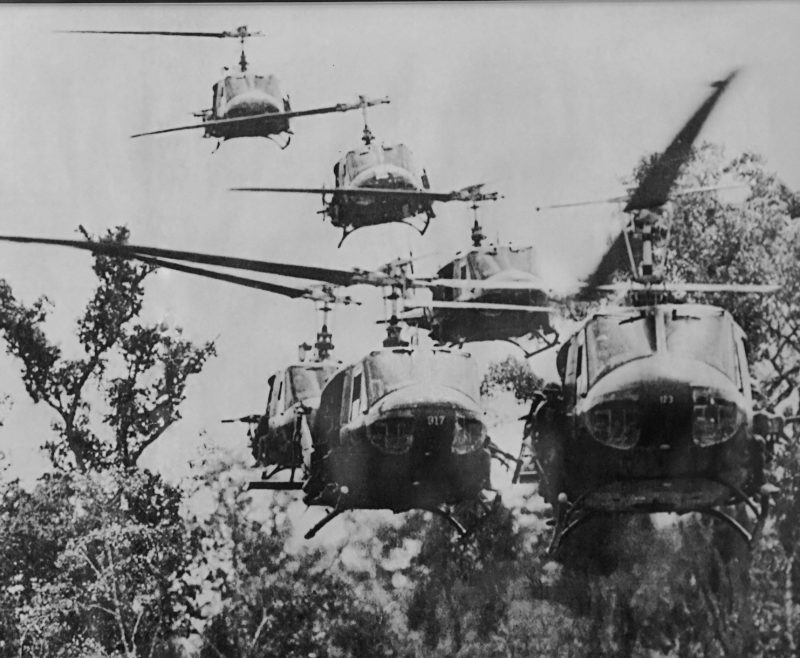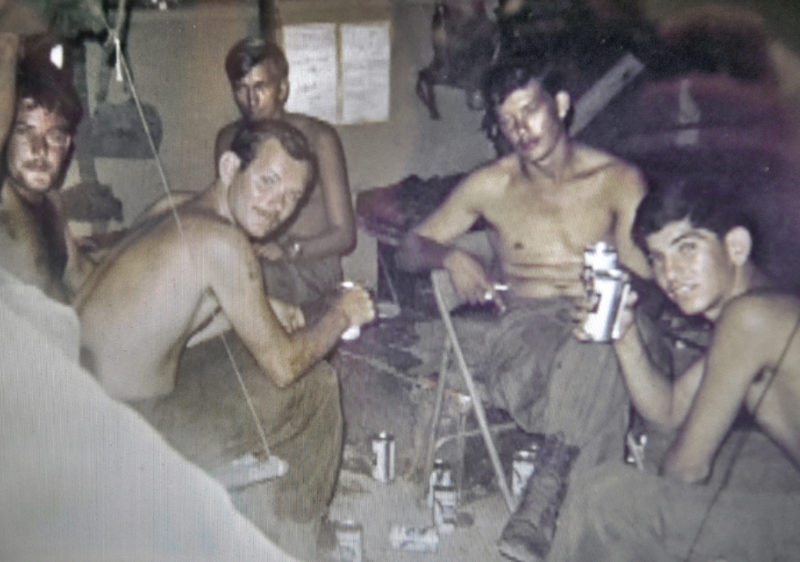“God could not be everywhere, and therefore he made mothers.” — Rudyard Kipling
Soldiers have always lied to their mothers during war, it seems. And in those moments on the battlefield, they turn to honest prayer.
As a helicopter gunner in South Vietnam, Sgt. Donald Zennie was called to a “hot one,” or an emergency evacuation. These situations were the most dangerous and involved helicopter crews flying directly into or adjacent to battle zones, and evacuating soldiers under extreme duress from enemy fire. Before taking off, the right side gunner, who wasn’t a part of their normal crew, volunteered to go on the mission.
Zennie said they took off, reached the heavily combative landing zone, and under the cover of night, they attempted to land, failing each time because their lights were off. The pilot couldn’t see and would need to turn them on.
The North Vietnamese were laying down fire, encircling the American troop line, leaving the troops in a perilous situation. Zennie’s Chopper 226 was the sole source of hope, and everyone knew it.
They also knew what the cost was likely going to be. “I just knew I was dead,” Zennie said, adding that he was praying the whole time.
But as they came down, a miracle happened. “The firing stopped.”
As they unloaded the ammunition and loaded on the wounded and dead bodies, his fellow gunman on the right side handed beers to the Americans there, and they pulled out.
“The firing resumed,” said Zennie. “Don’t know how or why, but that was it.”
Zennie doesn’t know if it was his praying, wishful thinking or that the Vietnamese mistook their single Chopper 226 as the entire 1st Calvary Division. “I have no idea still to this day.”
After they got back, Zennie, visibly shaken and scared, calling it his “closest call,” turned to the gunner on the right side and asked him why he had volunteered for the mission.
“‘I’m going home in two days,’” the guy told Zennie.
“Well what the hell are you doing then?” the crew all responded.
“I wanted to have one last hot one,” Zennie said the gunner responded.
No one told their mothers about that day until they asked.

Early Life
Zennie was born Oct. 14, 1950, as the second child to Elizabeth and John Zennie in Joliet, Illinois.
His father died when he was 18 months old, but his mother, who had grown up during the Depression, was able to find ways to provide for Zennie and his older sister as a bookkeeper.
“My sister acted like my mom. She still thinks she’s my mom,” said Zennie. “But she made it fun.”
Zennie and his older sister have a 10-year gap between them, and after she was taken under the wing of a woman interested in her education, his older sister was off to a private college in the Bay Area to study to become a professional opera singer.
This left Zennie to his own devices, losing who he thought of his “second mom,” and he learned to go outside with the other neighborhood kids and play games.
Once he reached high school, the Gulf of Tonkin incident had already occurred and the U.S. presence in Vietnam was escalating. However, Vietnam was in the rear-view mirrors of a 1956 Chevy.
“I loved that car … I was always working on it,” said Zennie. “But I wrecked it trying to flirt with a girl.”
Zennie said he wasn’t much of a sportsman and was a C student, but he could find his way around an engine.
And that’s why, within a year of his high school graduation, he would find himself flying over the jungles of Vietnam, taking fire, inside the belly of a helicopter as an 18-year-old kid.

Vietnam
“At the time there was the lottery and I don’t remember what my number was, but it wasn’t good,” said Zennie. “I signed up to be an aviation mechanic, but ended up being in helicopters.”
Zennie said that after enlisting, hoping to avoid the unfortunate position of ending up being drafted, he did his boot camp in Monterey and helicopter training at Fort Rucker, and then was off to Vietnam.
However, Zennie wasn’t always a crew chief strapped to a 50-caliber machine gun, dangling out the side of Chopper 226. For his first few weeks, he was either on kitchen patrol, washing an endless amount of dishes, or on guard duty every night hating every minute of it.
That was until a platoon sergeant walked in and asked him if he wanted to go into the air.
“Every time I got the stack of dishes down, they brought another one in,” said Zennie. “Flying was voluntary, and the platoon sergeant said, ‘Hey so and so is going home, do you want to be the crew chief on 226.’”
Zennie originally refused, but the platoon sergeant sweetened the deal.
“If you fly, no more guard duty, no more KP,” the sergeant said.
“Alright, I’ll fly,” Zennie responded.
Zennie said decades later, at a Vietnam helicopter crew reunion, he discovered this same platoon sergeant had successfully pulled off the same tactic on three other soldiers found working in the kitchens during a crew chief shortage.
“Promotions came fast” in Vietnam, Zennie said.

Happy Birthday
“My job was to maintain the helicopter every day, and then when the helicopter was on a mission, I manned the M60 on the left.”
The day-to-day life of being an E-5 helicopter crew chief was a “grind,” according to Zennie. Days could be as long as 12 hours, and during the second part of the Tet Offensive, of which he was a part, go 14 to 15 hours a day.
At the location where the 1st Calvary stayed, the Tay Ninh Combat base next to the Vietnam-Cambodia border, they were shelled regularly by North Vietnamese troops ushering in their artillery through Cambodia. And when he wasn’t sleeping, eating or getting shelled, helicopter 226 with Zennie on board was flying combat assault missions, extractions, supply missions, “milk runs,” or emergency supply runs.
He said on those missions you could know you and your helicopter were being shot at based on the AK-47 bullets flying up at you, and the green tracer rounds racing through the sky at you. He said his M60 would respond with a red tracer every fifth round, making it look like a laser.
“A fire base named Fire Base Ike was getting the s— kicked out of them, and the Vietnamese were getting through the (defensive) wire,” said Zennie, adding that 226 was called out to drop flares over the contact point and light up the night sky on the eve of his 19th birthday. “Every time we threw a flare, we flew over this one position where there were three anti-aircraft 50-cal. machine guns on my side … and I would return fire at 3,000 feet.”
“Every time, we circled over, we took fire,” he said. “So we’re circling, and it’s almost midnight and I’m on the skid returning fire, and the clock strikes midnight, and the crew starts singing happy birthday over the headset while I’m firing down.”
He says that story was one of the funny instances, a fond memory as far as war memories go that he took back from Vietnam.
But they weren’t always happy stories, he said. In addition to being the first division into Cambodia, taking fire meant exposing yourself regularly to bullets that had your name on them. At least once a bullet struck only a couple inches from Zennie’s head or rockets always landed nearby when on the ground.
“If we went a week without taking fire, we got a little edgy,” he said. “And it would come in, and your adrenaline is going. After that everything was calm … it was real interesting.”
By the end of his time in the war, Zennie had flown more than 1,000 missions, evacuated thousands of soldiers from front-line combat, delivered hundreds of wounded men back to the base, and helped hundreds of bodies return home to their families. His helicopter only went down twice.

Mothers
After serving for a year in Vietnam, followed by another year in Germany, in September 1971 Zennie was honorably discharged as an E-5 sergeant.
He took home with him a Bronze Star, a handful of Air Medals for Valor, a Vietnamese Unit Cross of Gallantry, and received multiple Presidential Citations.
When he first arrived home he said he slept for two days straight. When asked by his sister if he wanted a steak cooked for him for his first meal back, he asked only for a peanut butter and jelly sandwich. At one of the first parties he went to once he got back, his friend, who was taking him to a college party, told him, “It doesn’t bother me, but you should probably take your uniform off.”
His family, especially his mother and sister, were extremely happy to see him. They threw him a welcome back party and took care of him in the time immediately following. They also inquired about his medals and he told them how he had earned them.
Zennie went on to graduate from Loyola Marymount University and receive a degree in sociology. He became a probation officer at a juvenile detention center, and then got into commercial real estate investment, a sector in which he currently works and is successful.
He said he had dreams every now and then that would wake him up in the dead of night. Once, when a bottle rocket went off a block away, he hit the ground instinctively, and everyone at the party thought it was a joke. He talks openly about it all now, and enjoys speaking with like-minded people regularly.
He’s hosted reunions for his 226 buddies, gone to Vietnamese veteran association conferences and meetups. He helped found the Special Olympics in Santa Clarita.
“I’d go back and do it all again,” he said. “It kind of made me who I am today.”
However, when recounting the events that led him to be successful, two truly stick out, two that truly “make me emotional,” he said.
One is the time, by some type of luck or mistake in the universe, his life was spared in a situation where he should’ve definitely been killed. And the other was the look of shock on his mother’s and sister’s faces when they asked about his medals when he got home.
“My mom saved all my letters that I wrote her (while over there in Vietnam) … in each one I lied and said ‘I’m doing well. ‘Nothing is happening.’ ‘Everything is safe.’
“She was surprised.”











